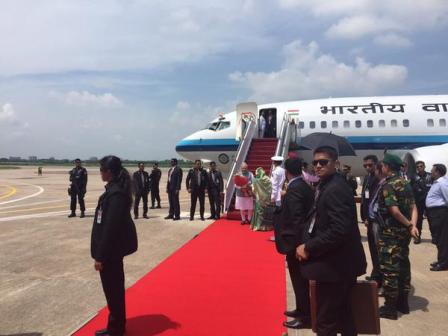
Modi arrives in Dhaka on crucial two-day visit
In a departure from protocol, Bangladesh Prime Minister Sheikh Hasina received Modi at Dhaka airport.
On his arrival Modi greeted the people of Bangladesh with a tweet saying, "Hello Bangladesh. I bring with me the affection & goodwill of the people of India".
As the two countries are set to ratify the long-pending Land Boundary Agreement by swapping enclaves, Modi's visit is being described as most significant by any Indian PM in recent times.
Before leaving for Bangladesh, he said the trip will strengthen bond between the two neighbouring nations.
"Leaving for Bangladesh. This visit is going to strengthen the bond between our Nations, benefitting people of our countries & our region," Modi tweeted.
West Bengal Chief Minister Mamata Banerjee reached Dhaka on Friday night, hours before the Indian Prime Minister lands in the country. She is the most prominent member of PM Modi's team.
Banerjee, PM Modi and Sheikh Hasina will flag off a bus service between Kolkata and Agartala via Dhaka and the Dhaka-Shillong-Guwahati bus service on Saturday.
During the visit, part of his policy to deepen engagement with India's immediate neighbours, Modi will hold wide-ranging talks with Sheikh Hasina, who will also host him to a banquet on Saturday night.
On Sunday, Modi will address the Indian community in Bangladesh.
Reports said he is expected to send a strong message to strengthen the hand of Sheikh Hasina, who has steadfastly helped India curb insurgent groups which used to take refuge in that country, besides beginning a crackdown on radical Islamist outfits.
The Indian government on Friday said Narendra Modi's visit to Bangladesh will 'consolidate and deepen' the relationship between the two nations.
"The centre piece of his visit is the conclusion of the Land Boundary Agreement," Foreign Secretary S. Jaishankar told media.
In a significant move, the Indian Parliament last month cleared the historic land agreement with Bangladesh to settle a long border dispute.
In 1974, the then leaders of the two countries - Indira Gandhi of India and Sheikh Mujibur Rahman of Bangladesh - agreed to swap almost 200 enclaves of land located in one country but officially belonging to the other.
But with the assassination of Sheikh Mujibur Rahman in 1975, the process of the agreement stopped for a long time," Ali said.
The agreement, which has since been updated, will be "a historic milestone in the relationship between the two neighbouring south Asian countries," Bangladesh Foreign Minister Abul Hassan Mahmood Ali said on Friday.
Under the agreement, the 106 Indian enclaves in Bangladesh and 92 Bangladeshi enclaves in India, which remained foreign territories inside each country will be handed over to each other, solving the problem of truncated territories and the distress of enclave inhabitants, living for long in isolation.
Their inhabitants - about 37,330 in Indian enclaves and 14,200 in Bangladeshi enclaves - are deprived of public services because their governments have no access to them.
Ali said the two countries would also sign a number of deals to boost trade and security along the border and fight human trafficking.
Officials of the two neighbouring countries would also discuss a possible increase in Indian aid for Dhaka and in Bangladeshi electricity imports from India.
Reports said Bangladesh capital Dhaka wears a festive look, with life-size cutouts of PM Modi, Mamata Banerjee and Bangladesh Prime Minister Sheikh Hasina dotting the city. Headlines in Dhaka newspapers focused on the visit. "Modi flies in Today, Hopes so High," said a banner headline of The Daily Star, a leading English daily of Bangladesh.
Support Our Journalism
We cannot do without you.. your contribution supports unbiased journalism
IBNS is not driven by any ism- not wokeism, not racism, not skewed secularism, not hyper right-wing or left liberal ideals, nor by any hardline religious beliefs or hyper nationalism. We want to serve you good old objective news, as they are. We do not judge or preach. We let people decide for themselves. We only try to present factual and well-sourced news.







